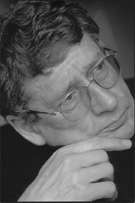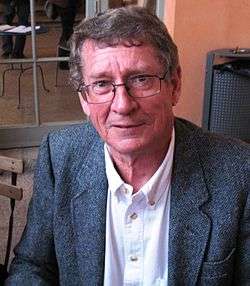André Brink
| André Brink | |
|---|---|
|
André Brink in Lyon, France, June 2007 | |
| Born |
André Philippus Brink 29 May 1935 Vrede, South Africa |
| Died |
6 February 2015 (aged 79) On a flight from the Netherlands to South Africa |
| Occupation | Writer |
| Language | Afrikaans, English |
| Nationality | South African |
| Alma mater |
University of Potchefstroom Sorbonne University |
| Notable works |
A Dry White Season An Act of Terror A Chain of Voices |
André Philippus Brink, OIS (29 May 1935 – 6 February 2015) was a South African novelist. He wrote in both Afrikaans and English and was a Professor of English at the University of Cape Town.[1]
In the 1960s he, Ingrid Jonker, Etienne Leroux and Breyten Breytenbach were key figures in the significant Afrikaans literary movement known as Die Sestigers ("The Sixty-ers"). These writers sought to use Afrikaans as a language to speak against the apartheid government, and also to bring into Afrikaans literature the influence of contemporary English and French trends. While Brink's early novels were especially concerned with apartheid, his later work engaged the new range of issues posed by life in a democratic South Africa.
Biography
Brink was born in Vrede, in the Free State. Brink moved to Lydenburg, where he matriculated at Hoërskool Lydenburg in 1952 with seven distinctions, the second student from the then Transvaal to achieve this feat and studied Afrikaans literature in the Potchefstroom University of South Africa. His immense attachment with literature carried him to France from 1959 to 1961, where he got his degree from Sorbonne University at Paris in comparative literature.
During his stay, he came across an undeniable fact that changed his mind forever: black students were treated on an equal social basis with other students. Back in South Africa, he became one of the most prominent of young Afrikaans writers, along with the novelist Etienne Leroux and the poet Breyten Breytenbach, to challenge the apartheid policy of the National party through his writings. During a second sojourn in France between 1967 and 1968, he hardened his political position against Apartheid, and began writing both in Afrikaans and English to enlarge his audience and outplay the censure he was facing in his native country at the time.
Indeed, his novel Kennis van die aand (1973) was the first Afrikaans book to be banned by the South African government.[2] André Brink translated Kennis van die aand into English and published it abroad as Looking on Darkness. This was his first self-translation.[3] After that, André Brink wrote his works simultaneously in English and Afrikaans.[4] In 1975, he obtained his PhD in Literature at the Rhodes University.
In 2008, in an echo of a scene from his novel A Chain of Voices, his family was beset by tragedy, when his nephew Adri Brink was murdered in front of his wife and children in their Gauteng home.[5]
He died on a flight from Amsterdam to South Africa from Belgium, where he had received an honorary doctorate from the Belgian Francophone Université Catholique de Louvain.[6] He was married six times. Brink's son, Anton Brink, is an artist.[7]
Works
- For a more comprehensive publication list, see the Afrikaans article on André P. Brink.
Novels
- The Ambassador
 André Brink
André Brink - Looking on Darkness (1973)
- An Instant in the Wind (1975)
- Rumours of Rain (1978) - short listed for the Booker Prize[8]
- A Dry White Season (1979)
- A Chain of Voices (1982)
- The Wall of the Plague
- States of Emergency (1989)
- An Act of Terror (1992)
- The First Life of Adamastor (1993)
- On the Contrary (1994)
- Imaginings of Sand (1996)
- Devil's Valley (1998)
- The Rights of Desire (2000)
- The Other Side of Silence (Anderkant die Stilte) (2002)
- Before I Forget (2004)
- The Other Side of Silence (2004)
- Praying Mantis (2005)
- The Blue Door (2006)
- Other Lives (2008)
- Philida (2012)
Memoirs
- A Fork in the Road (2009)
Essays
- Languages of the Novel: A Lover’s Reflections (1998)
Notes
- ↑ Cowell, Alan (2015-02-07). "André Brink, South African Literary Lion, Dies at 79". The New York Times. Retrieved 2015-04-30.
- ↑ Brink, André (11 September 2010). "A Long Way From Mandela's Kitchen". New York Times. Retrieved 15 October 2012.
One of my novels had the dubious distinction of being the first book in Afrikaans to be banned under apartheid.
- ↑ Brink, André (2003): "English and the Afrikaans Writer" in: Steven G. Kellman Switching languages. Translingual writers reflect on their craft. University of Nebraska Press, p. 218.
- ↑ "A Chain of Voices (review)". Retrieved 2010-06-14.
- ↑ For better or worse The Economist. 12 February 2009
Between staying and going The Economist. 25 September 2008 - ↑ Thorpe, Vanessa (7 February 2015). "André Brink, anti-apartheid novelist and campaigner, dies aged 79". The Observer. Retrieved 14 February 2015.
- ↑ "anton brink". South African Artists. Archived from the original on 18 June 2008. Retrieved 2008-06-27.
- ↑ "The Booker Prize 1978". The Man Booker Prize. 1978. Retrieved 2015-04-30.
External links
| Wikimedia Commons has media related to André Brink. |
- André Brink at British Council: Literature
- André Brink at the Internet Book List
- André Brink on Books LIVE
- Hope, Christopher (31 January 2009). "Traitor to the Tribe". The Guardian. Retrieved 2 June 2009.
